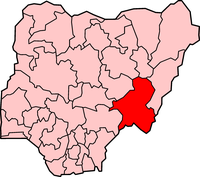Taraba state has its capital in the city of Jalingo and is domiciled within the Northcentral geopolitical zone of Nigeria. Taraba state shares borders with Nasarawa, Benue, Plateau, Bauchi, Gombe, and Adamawa states including the Republic of Cameroon.
Popular towns in Taraba include Bali, Lau, Takum, and Ussa. The tribes found in Taraba state include the Fulani, Yandang, Tikari, Hausa, Jenjo, Jibana, Kuteb, Mumuye, Mambilla, Wurkum, Fulani, Jukun, Ichen, Tiv, Kaka, Panso, Kambu, Wawa, Vute, Ndola, Idoma, Karimjo, Bakulung, Babur, Bambuko, Chukkol, Pulbe, Gonia, Gwom, Jero, Kadara, Mbum, Lau, Tarok, Potopo, Shomo, Yott, Sate, and the Chamba. Taraba state boasts a total of 16 LGAs which include Ardo Kola, Bali, Donga, Gashaka, Gassol, Ibi, Jalingo, Karim Lamido, Kurmi, Lau, Sardauna, Takum, Ussa, Wukari, Yorro, and Zing with an estimated total population of about 2,300,736 inhabitants. Islam and Christianity are the widely practiced religions in Taraba state. Tertiary institutions found in Taraba state include the College of Education Zing, Federal University Wukari, Taraba state Polytechnic Suntai, Taraba state University, Taraba state University of Agriculture Jalingo, Jubilee University Wukari, and the Kwararafa University Wukari.
Popular festivals in Taraba state include the Nwonyo fishing festival, Kachicheb Harvest Festival, Puje festival, Purma festival, Belle, Yonko Yam festival, Kati harvest festival, Kambu cultural festival, Ekpan Fure Jukun festival, Asamu festival and the Minhu hunting festival. Notable landmarks in Taraba state include the Yankari National park, the Donga river basin Forest and the Gashaka Gumti National park.
The Governor of Taraba State is Darius Ishaku.
Nature's Gift to the Nation
Taraba state has a total area of 54,473 km squared and the topography consists of undulating landscapes characterized by small mountains. Taraba state has characteristics of the Mambilla plateau and has a low forest and grassland vegetation.
The average temperature of Taraba state is 30 degrees centigrade with two distinct seasons which are the dry and the rainy seasons with total rainfall distribution at about 950 mm per annum.
Farming is the major occupation of the people of Taraba state with the cultivation of coffee, tea, groundnut, cotton, maize, rice and sorghum. Trade also flourishes in Taraba state with the state playing host to a plethora of markets which include the Jalingo ultra-modern market, Gadar Bobboji market, Kasuwan Bera market, Mile 6 market, Central market, Garba Shade market, Wukari yam market, Sarkin kudu market, and the Chanchangi market.
Also, Animal rearing and fishing are popular economic practices among the populace of Taraba state. Mineral resources found in Taraba state include Agates, Amethyst, Quartz, Barite, Bauxite, Bentolitic Clay, Beryle, Calcite, Cassiterite, Copper Ore, Flourite, Galena, Gold, graphite, Rutile Sapphire, Topaz, Uranium, Zircon, and Zinc Ore.
Taraba state was created in August 1991 from the defunct Gongola state under the Ibrahim Babangida regime. Past governors/administrators of the state include
Adeyemi Afolahan- 1991-1992
Jolly Nyame- 1992-1993
Yohanna Dickson- 1993-1996
Amen Oyakhire- 1996-1998
Aina Owoniyi- 1998-1999
Jolly Nyame - 1999-2007
Danbaba Suntai- 2007-2012
Garba Umar- 2012-2013
Sani Danladi - 2013-2015
Darius Ishaku- 2015 to date.
4 based on 0 reviews

Find and explore some of the best businesses in Taraba State.
© 2026 Manpower Nigeria. All rights reserved.